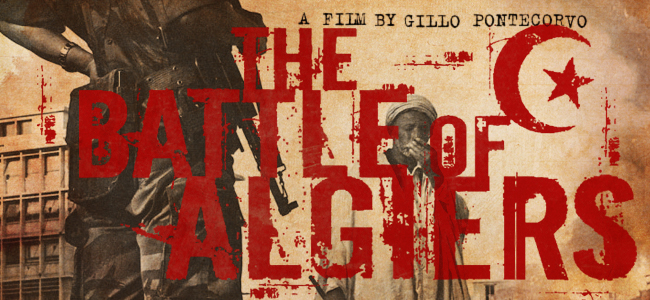|
|
 |
|

(1966, directed by Gillo Pontecorvo)
- inducted 2017 –
“The legendary stature of The Battle of Algiers is hardly in question. From the infamous stories of Black Panthers
taking notes during screenings on how to stage a revolution, to its showing at the Pentagon just before the invasion of Iraq
(obviously more than a few lessons were ignored), the relevancy and potency of its message has perhaps only gotten stronger
as the film approaches the 50th anniversary of its U.S. premiere. However, the message would mean very little indeed without
a form, and Gillo Pontecorvo provides a truly remarkable one, full of anger, passion, and most of all humanity.
“The circumstances of production are perhaps even better known than the impact of the film itself: the cast almost entirely
comprised of non-actors, the handheld documentary realism so convincing that US theaters ran a disclaimer before each showing
stating that no real newsreel footage was used. Even more striking is the marriage of these gestures towards realism with
the general framework of a thrilling procedural, worked through both sides of the conflict. The much-vaunted even-handedness
of the whole venture, refusing to paint either Algerians or French as angels or devils (though it is clear Pontecorvo and
company side with the Algerians), only makes the carnage inflicted on both individual and crowd all the more discomfiting.
“But more than anything, though there is an easily definable protagonist (Ali la Pointe) and antagonist (Colonel Mathieu,
almost certainly among the most noble villains to ever grace the screen), The Battle of Algiers belongs to the masses,
to the faces that, when glimpsed even just once, imprint themselves onto the shifting fabric that defines the material of
a revolution. It is this revolution that is paid tribute to and given life anew through celluloid that forms one of the great
political films of all time.
~ Ryan Swen
|
 |
|
Original title: La Battaglia di Algeri
Principal cast: Jean Martin, Yacef Saadi, Brahim Hadjadj, Samia Kerbash, Tomasso Neri, Ugo Paletti, Fusia El Kader, Franco
Moruzzi, Mohamed Ben Kassen
Story by Franco Solinas and Gillo Pontecorvo
Screenplay by Franco Solinas
Produced by Antonio Musu and Yacef Saadi
Director of photography Marcello Gatti
Production design by Sergio Canevari
Film editing by Mario Morra and Mario Serandrei
Original music by Ennio Morricone and Gillo Pontecorvo
Makeup by Maurizio Giustini
Hair stylist Hamdi Mohamed
Sound by Alberto Bartolomei, Omar Bouksani
Executive producer Fred Baker (uncredited)
Costume design by Giovanni Axerio (uncredited)
Special effects by Aldo Gasparri (uncredited)
Italy
Duration: 120 minutes
Languages: Arabic, French
Filmed in black and white
Sound mix: mono
Cinematographic process: Spherical
Aspect ratio: 1.85:1
Printed film format: 35mm
Produced by Casbah Film and Igor Film
Released in USA by Rizzoli
Premiered at the Venice Film Festival on August 31, 1966
USA release date: September 20, 1967
Awards and honors:
- Selected as one of Roger Ebert’s “Great Movies,” October 10, 2004
- Venice Film Festival, 1966: Golden Lion (winner)
- BAFTA Film Awards, 1972: UN Award (winner)
- Academy Awards (USA), 1967: Best Foreign Language Film (nominee)
- Academy Awards (USA), 1969: Best Director – Gillo Pontecorvo (nominee)
- Academy Awards (USA), 1969: Best Writing, Story and Screenplay – Franco Solinas and Gillo Pontecorvo (nominee)
- NYFCC Awards, 1967: Best Foreign Language Film (nominee)
|
 |
|
|
 |
|
|
 |
|
|
|
|
|
|
 |

